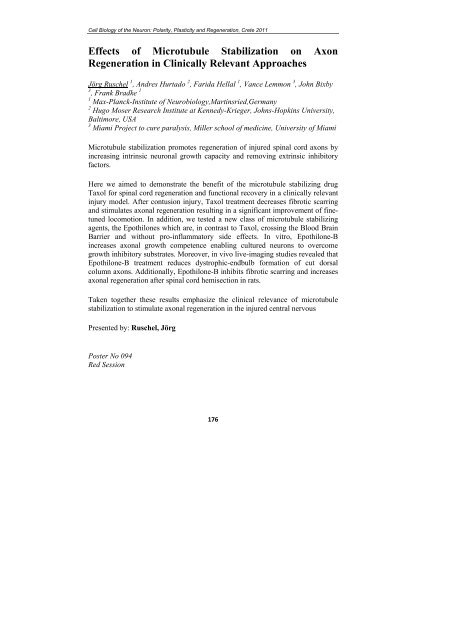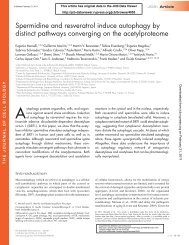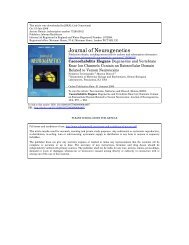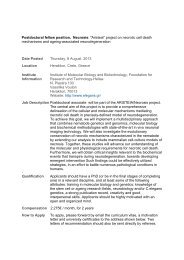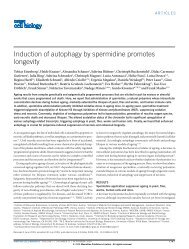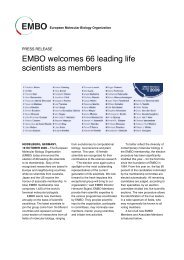CELL BIOLOGY OF THE NEURON Polarity ... - Tavernarakis Lab
CELL BIOLOGY OF THE NEURON Polarity ... - Tavernarakis Lab
CELL BIOLOGY OF THE NEURON Polarity ... - Tavernarakis Lab
You also want an ePaper? Increase the reach of your titles
YUMPU automatically turns print PDFs into web optimized ePapers that Google loves.
Cell Biology of the Neuron: <strong>Polarity</strong>, Plasticity and Regeneration, Crete 2011<br />
Effects of Microtubule Stabilization on Axon<br />
Regeneration in Clinically Relevant Approaches<br />
Jörg Ruschel 1 , Andres Hurtado 2 , Farida Hellal 1 , Vance Lemmon 3 , John Bixby<br />
3 1<br />
, Frank Bradke<br />
1<br />
Max-Planck-Institute of Neurobiology,Martinsried,Germany<br />
2<br />
Hugo Moser Research Institute at Kennedy-Krieger, Johns-Hopkins University,<br />
Baltimore, USA<br />
3<br />
Miami Project to cure paralysis, Miller school of medicine, University of Miami<br />
Microtubule stabilization promotes regeneration of injured spinal cord axons by<br />
increasing intrinsic neuronal growth capacity and removing extrinsic inhibitory<br />
factors.<br />
Here we aimed to demonstrate the benefit of the microtubule stabilizing drug<br />
Taxol for spinal cord regeneration and functional recovery in a clinically relevant<br />
injury model. After contusion injury, Taxol treatment decreases fibrotic scarring<br />
and stimulates axonal regeneration resulting in a significant improvement of finetuned<br />
locomotion. In addition, we tested a new class of microtubule stabilizing<br />
agents, the Epothilones which are, in contrast to Taxol, crossing the Blood Brain<br />
Barrier and without pro-inflammatory side effects. In vitro, Epothilone-B<br />
increases axonal growth competence enabling cultured neurons to overcome<br />
growth inhibitory substrates. Moreover, in vivo live-imaging studies revealed that<br />
Epothilone-B treatment reduces dystrophic-endbulb formation of cut dorsal<br />
column axons. Additionally, Epothilone-B inhibits fibrotic scarring and increases<br />
axonal regeneration after spinal cord hemisection in rats.<br />
Taken together these results emphasize the clinical relevance of microtubule<br />
stabilization to stimulate axonal regeneration in the injured central nervous<br />
Presented by: Ruschel, Jörg<br />
Poster No 094<br />
Red Session<br />
176


